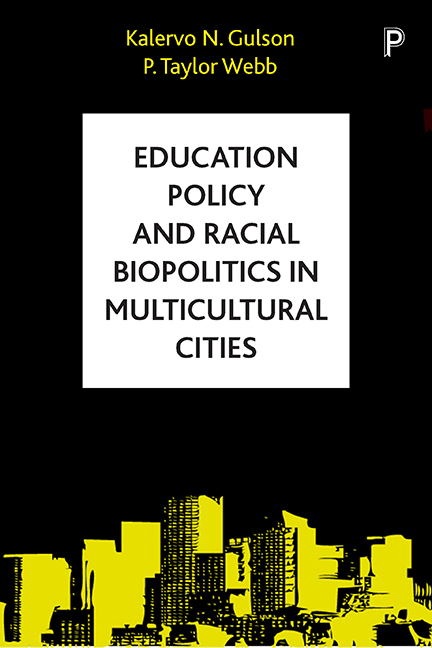Book contents
- Frontmatter
- Contents
- Notes on authors
- Acknowledgements
- Foreword
- Introduction: education policy and multicultural cities
- One Policy events
- Two Policy and biopolitics: the event of race-based statistics in Toronto
- Three The (micro)politics of racial neoliberalism With Viviana Pitton
- Four ‘Up in the northwest corner of the city’: the city, race and locating the school
- Five Difference and recognition
- Six Policy events, race and the future of the city
- References
- Index
Three - The (micro)politics of racial neoliberalism With Viviana Pitton
Published online by Cambridge University Press: 05 April 2022
- Frontmatter
- Contents
- Notes on authors
- Acknowledgements
- Foreword
- Introduction: education policy and multicultural cities
- One Policy events
- Two Policy and biopolitics: the event of race-based statistics in Toronto
- Three The (micro)politics of racial neoliberalism With Viviana Pitton
- Four ‘Up in the northwest corner of the city’: the city, race and locating the school
- Five Difference and recognition
- Six Policy events, race and the future of the city
- References
- Index
Summary
This chapter maps the event of the alternative school policy of the Toronto District School Board (TDSB). The focus of this chapter is to map neoliberalism, and specifically racial neoliberalism, onto the city of Toronto. To accomplish what we might call this policy cartography (Webb and Gulson, 2013), the chapter traces the policy development of the Africentric Alternative School within the TDSB to identify how the school's development moved between different spaces and between different times.
Our tracing of a specific instance of neoliberalised policy is placed in relation to broader attempts to develop racial equity in schooling. In other words, this chapter traces ‘local’ and micropolitical instances of the board's alternative school policy in relation to ‘global’ and macropolitical influences of educational and racial neoliberalism. This ‘fluid’ analysis looks at how power and force operate within educational equity attempts and illustrates the necessary but, ultimately, insufficient attempts at educational equity that rely solely on moral and epistemological, including statistical, arguments.
As such, this chapter does not explicate the epistemological influences or knowledge claims influencing the event of the school's becoming; instead, this chapter aims to explore material and ontological aspects of the policy environment affecting the event. The spatial and temporal analysis of this chapter underscores how objects and subjects easily interchange positions depending on the location of the analysis. As such, this chapter maps (1) how policy ‘activists’ simultaneously are policy ‘subjects’; (2) how school mission statements are simultaneously efforts to develop a brand within educational quasi-markets; (3) how discourses of parental choice are conflated into contradictory discourses of educational entrepreneurialism and equity; and (4) how moral statements against racism are erased through pressures to maintain the dominant policies and practices of colour-blind (neoliberal) multiculturalism.
Toronto's fertile neoliberal educational environment
The Toronto Star reported that Angela Wilson learned about the TDSB's alternative school policy in 2003 while participating in an education forum in Etobicoke, a western borough of Toronto. According to the Star, Wilson was surprised to learn that the board encouraged parents to establish alternative schools (Toronto Star, 18 November 2007).
Although a year would pass before she would obtain a copy of the dormant policy, Wilson continued a series of critiques about the education her children received in Etobicoke.
- Type
- Chapter
- Information
- Education Policy and Racial Biopolitics , pp. 53 - 76Publisher: Bristol University PressPrint publication year: 2017



